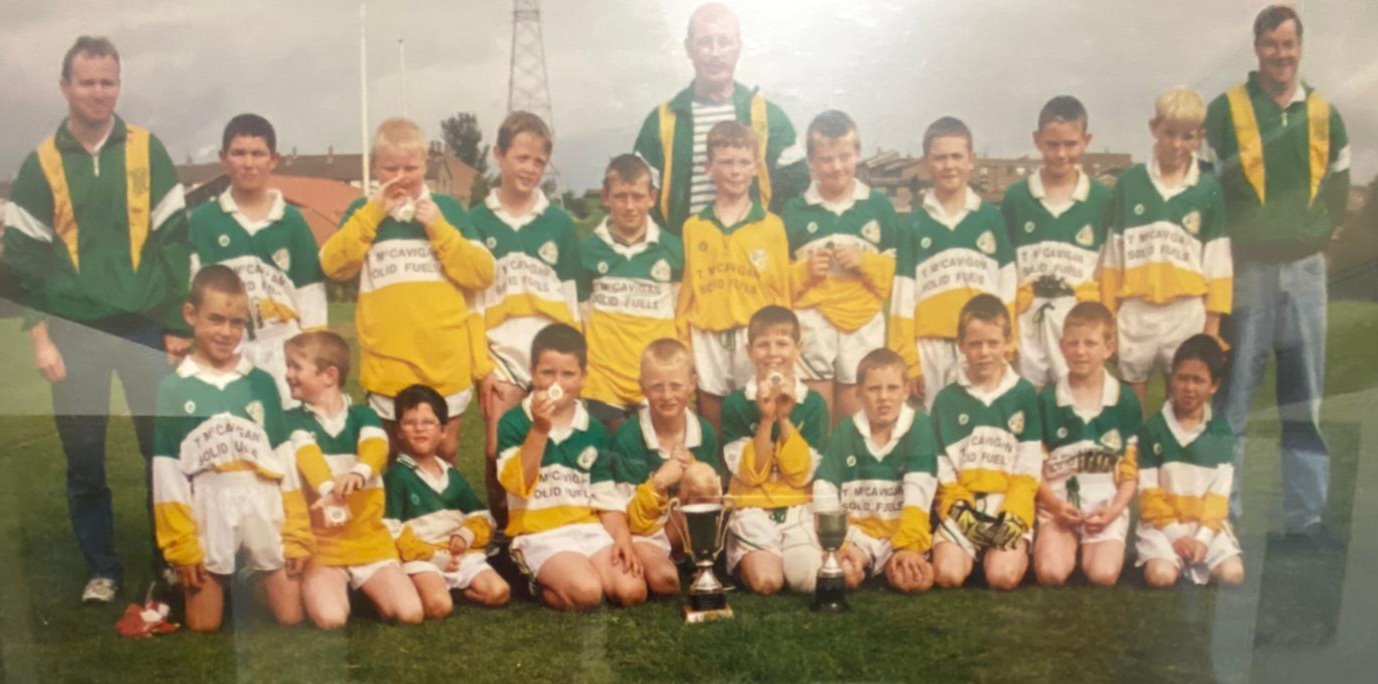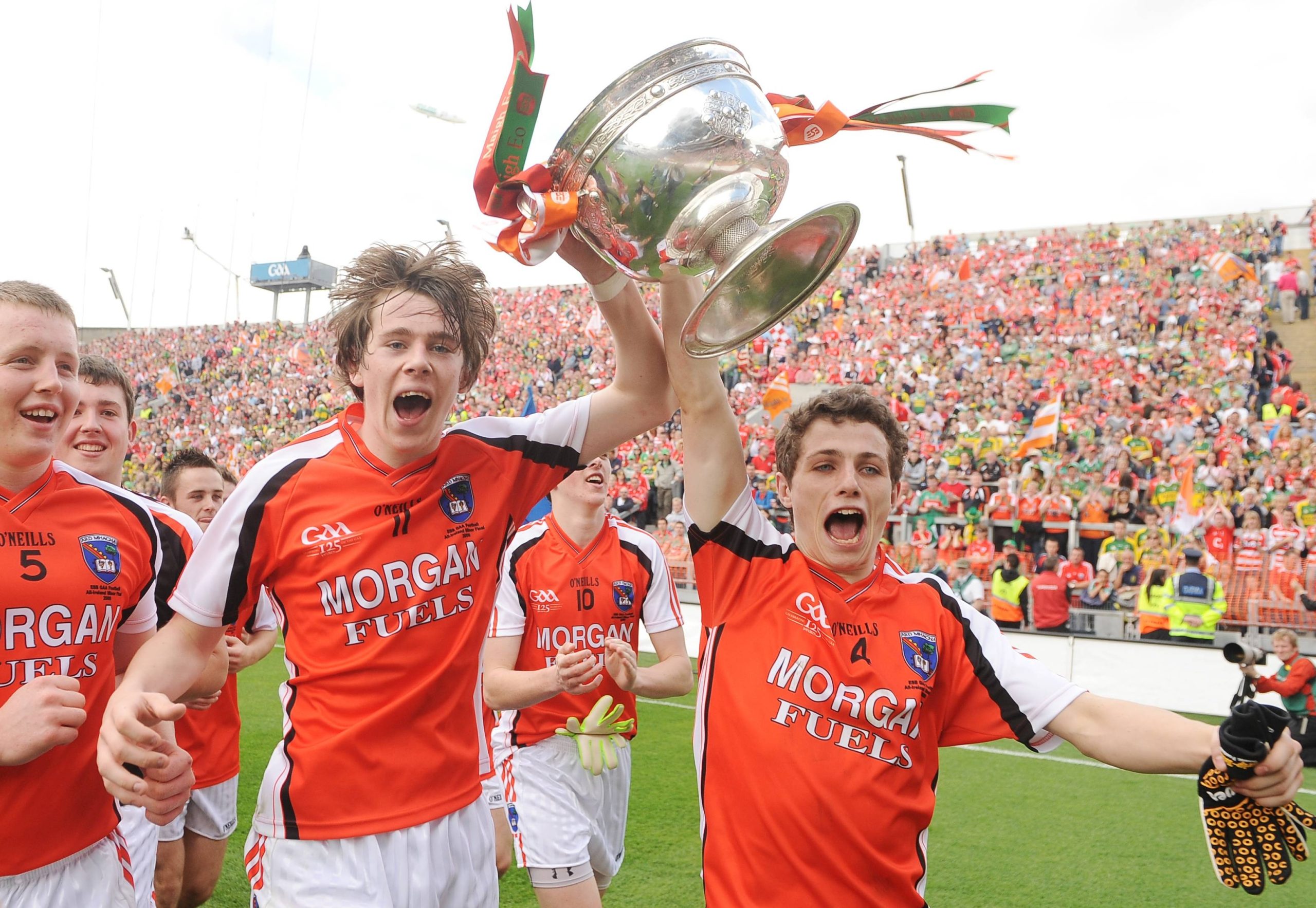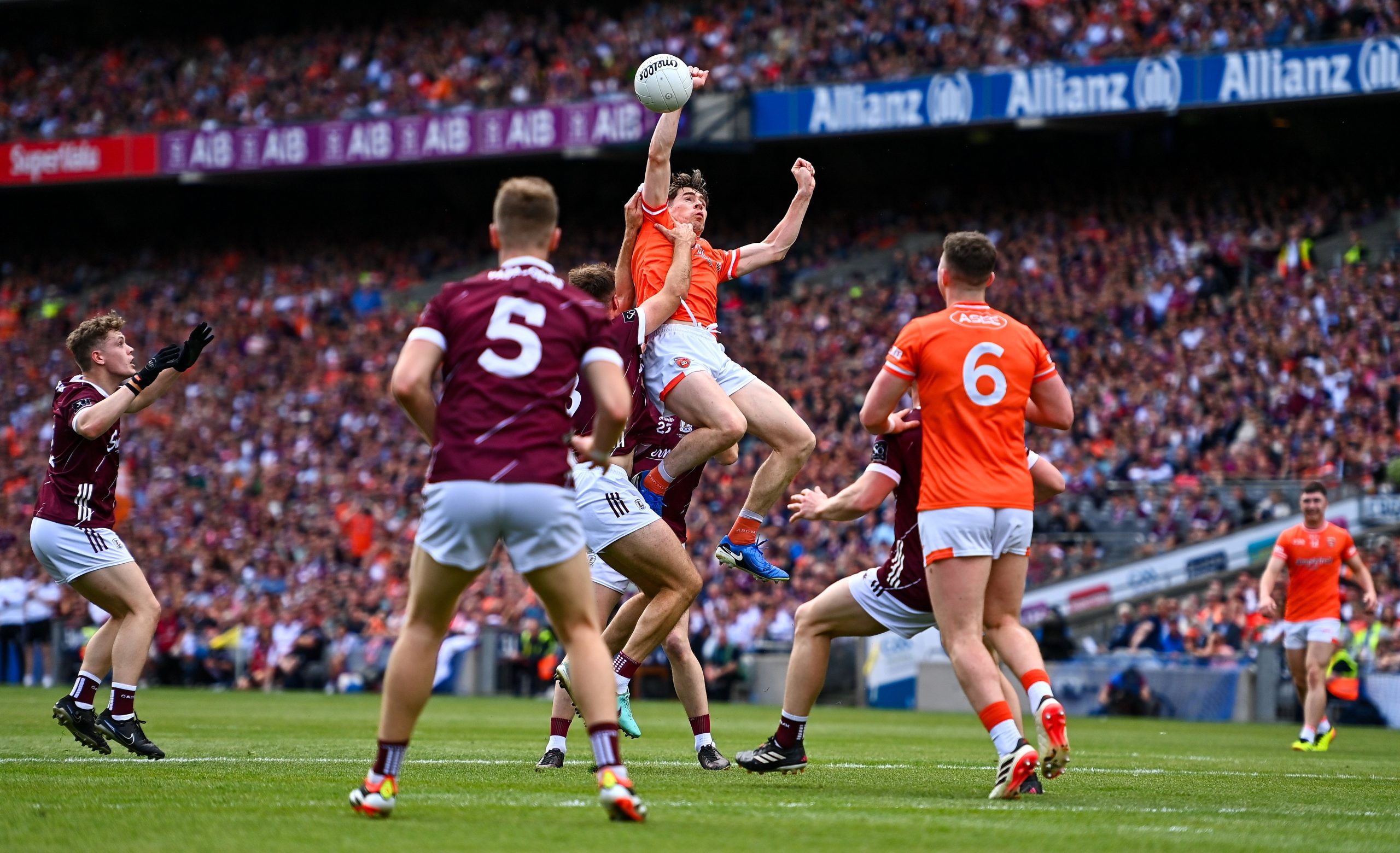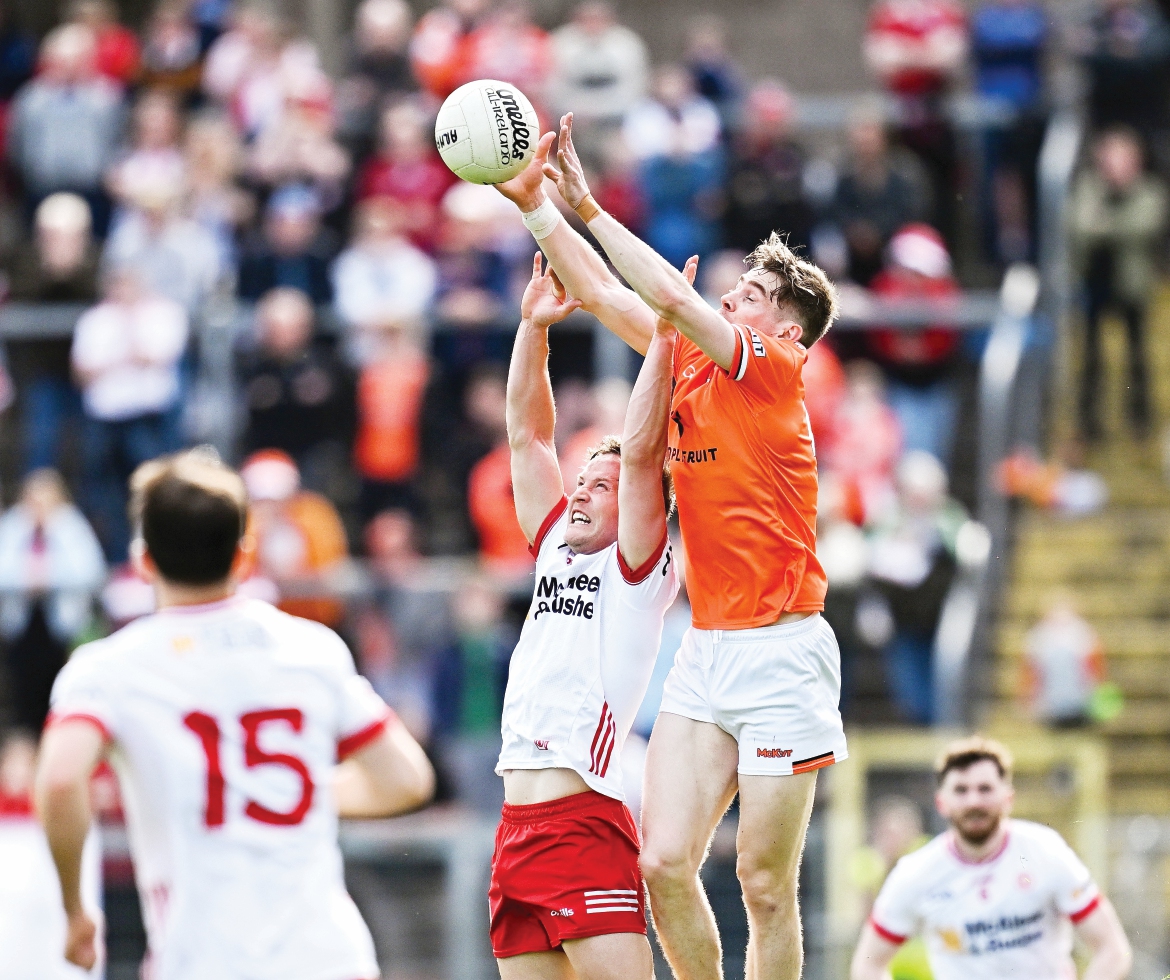Andrew Murnin could’ve been the secret weapon the country never laid eyes on. Shane McConville knew it and so did Kieran McGeeney. Michael McMullan writes…
FÓGRA. There are three changes on the Armagh team. The Athletic Grounds is packed. Last Saturday marked the 10th anniversary of the day.
It’s a wall of colour. The 2014 All-Ireland finalists Donegal are in town. Andrew Murnin is one of the three changes, coming in for his debut, ahead of Kevin Dyas.
It’s a first Ulster Championship game for Kieran McGeeney as manager, after joining Paul Grimley’s management team 12 months earlier.
Murnin was man of the match as Armagh won the All-Ireland Minor title in 2009 but didn’t take up previous managers’ Grimley or Paddy O’Rourke senior invitations.
There was a lads’ holiday the first year. A summer in Boston came calling after that. There was always a concern that county football curtailed club involvement.
From the minute his neighbour Jimmy Boyle floated the idea of underage football, St Paul’s was close to his heart.
The pitch wasa decent thump of a football from his home in Lurgan’s Taghnevan estate.
And he might not have even played for Armagh. It could’ve been Derry. His mother Briege, nee McNally, hailed from Ballinderry.
It could’ve been Down. His father Andy Joe played with Clonduff. When they moved to Lurgan, 40 years ago, he transferred to Éire Óg where he played full-back on their Junior Championship winning team.
Anthony Tohill was Murnin junior’s early hero. The Derry legend’s signature is on a football that nestled in his wardrobe.
“I always wanted to play midfield because of him. Even at u-10,” Murnin told Niall McCoy of this parish in his only ever sit-down interview. Talking the game didn’t float his boat.
“He led on the pitch by how he played,” said Shane McConville, who Murnin remembers coaching him the catch as a gasan in Taghnevan Community Centre.

EARLY DAYS…Andrew Murnin (front row, third from right) on a St Paul’s underage team
In a Gaelic Life Q&A in 2017, he couldn’t separate McConville and McGeeney as the best manager he’d played under.
“He wasn’t a massive talker,” McConville said, “but he done his talking when that ball was in the air, when he had his hands on it and when his feet hit the ground.”
Murnin and McGeeney are in the Armagh bubble the same length of time but the first half was a write off. His hamstrings kept saying no. There were four tears in five horrendous months in the 2016.
Injury kept him out of the All-Ireland quarter-final hammering by Tyrone the following year. When Mayo edged them out in the 2019 Qualifiers, Murnin was again on the outside looking in.
Earlier that season, Armagh needed extra-time to see off Down, their first Ulster win in five attempts under McGeeney. Murnin kicked a point after coming in off the bench and rose to flick a Rian O’Neill ball to the net, in off the post, for the winning goal.
In McGeeney’s final year of an initial five-year term, it could be argued as the most vital of scores.
There was a rare moment where Ireland saw Murnin in full flight. Himself and ’09 winning minor wing-man Rory Grugan each pinged four first-half points in a 2018 shootout with Roscommon but there was another hamstring twinge by the time Joe McQuillan sounded the final whistle. Armagh were out.
Of the 53 championship games since his debut against Donegal, Murnin has played in 44. Of the last three seasons, he missed an Ulster opener against Antrim in 2023 and their mauling of Derry in the All-Ireland series last summer.
A lesser man would’ve pulled the pin. Physio Shea McAteer worked his magic and McGeeney knew how varied his team would look with a fully fit Murnin.
“At the minute I’m only really fit to play full-forward but in an ideal world I’d like to play a bit of both, forwards and midfield, for Armagh,” Murnin told McCoy five years ago, in the middle of lockdown.
“I’ve always wanted to be fit enough to play midfield for Armagh if I was needed, but I’m probably not there at the minute.”
Fast forward to last weekend. Ethan Rafferty planted a kick-out into the air, hanging under the stand in Kingspan Breffni. Out of nowhere, in the midst of Galway skyscrapers, Murnin flew through the air to take possession.
On the face of it, a ‘wow’ moment. Ask anyone in Armagh, it’s now the norm.
A dig into Armagh’s kick-out strategy over the last three seasons unpacks many cases of a flying Murnin leaping to their help when teams stemmed them building from the back.
So much so, that when Blaine Hughes banjaxed his knee in the warm-up of last year’s All-Ireland final, Murnin was out of commission.
Hughes went short 15 times out of 22. With Galway’s compact defence, a mirroring of Armagh, it was a recycling of the ball. Playing the percentages was the smart road to Sam.
When the Football Review Commitee rolled out their enhancements, McGeeney must’ve taken a quiet moment to ponder. Yes, his squad was deep, but Murnin opens up so many doors.
McConville stresses how comfortably he can kick off both feet, something often lost.
Murnin has variation. He can play inside under a floated delivery.
There is also the mantra of, in case of emergency, break glass. A midfielder. With the new kick-out arc, Murnin has a leap like few others and when he decides to break a ball, it stays broken. Nobody is catching it.
After managing Culloville against St Paul’s one day, Alan O’Neill gave McConville his assessment of Murnin as he crept into his early teens at Corn na nÓg level. He’d never saw the like of it. That spring off the ground and sheer elusiveness.
It wasn’t a shock. The fact it was based on playing against some of the top players in Ulster merely echoed it.
“I always remarked that Alan was the first person that ever really got him,” McConville admits.
“Whereas the rest of us, we probably got caught up in the ins and outs of bringing all the players through, as opposed to concentrating on any one in particular.”
By his u-16 grade, there was realism that he’d make it as a county minor.

MINOR DAYS…Declan McKenna, Andrew Murnin and Kevin Nugent celebrate with the Tom Markham Cup after Armagh’s 2009 All-Ireland minor win
“It was then that everybody started to take to take stock and have a real good look at him,” McConville added.
“What he possesses now is what he possessed then, believe it or not.
“He’s a very similar. Nothing has really changed with him. He was that elusive when he was young.”
***
McGeeney was Armagh manager just 45 days by the time St Paul’s and Grange locked horns in the Armagh Intermediate final.
It’s no surprise he lifted the phone to St Paul’s manager and former Armagh teammate Shane McConville.
“That game would be talked about by most people,” said McConville.
It’s a gem, tucked away in the depths of YouTube. St Paul’s played to their strengths. There was enough size at midfield to leave Murnin on the edge of the square. A weapon.
He won the first three balls into him. The first a dink allowing him to turn his man and pull a save out of the ‘keeper within the first minute.
He flicked another effort onto the crossbar. Sweepers didn’t work. Murnin’s leap was unmarkable.
After half-time he pulled off a breathtaking take at midfield and did likewise seconds later, catching a ball between two men to win a penalty. Late in the game, he was back fielding balls in defence.
An absolute tour de force. McGeeney needed him. End of. The concern was missing club football. McConville’s two selling points. Armagh wanted Andrew Murnin and the rest of Ireland needed to see Andrew Murnin.
It was a yes. His perseverance steered him past injury doubts and opposing managers across Ireland now know the name all too well.
“There wasn’t a blade of grass that he didn’t cover,” McConville said of the 2014 Intermediate final.
“There wasn’t a thing that he didn’t do. Anything he done, he done on his own bat. The only thing I take credit for, I didn’t stop him.”
That’s the modesty of McConville. A joke and the importance of letting players think for themselves.
Having managed other former Armagh county players Mickey McDonald, Kieran McNally, Jim McCorry and Denis Seeley in his younger days as manager, Murnin was just the same.
He never questioned. He just wanted a jersey and to go and play.
Others often wondered why McConville played his star man in full-forward. Was there not a danger a game could pass him by?
McConville’s outlook was simple. Murnin had a leap like no other and he could see who was running to support before his feet were back on terra firma.
“He is just a complete and utter freak of nature, his standstill jump would’ve been worth measuring,” McConville said.
“It’s all right jumping, but Andrew’s timing was an addition to his leap. The best time to jump is to time your leap to make sure the men in front of you are on their way down as you’re on your way up.
“That’s what Andrew Murnin had in abundance. You’d find that men were on their way up and Andrew maybe just coming up a split second later and hanging that bit of longer,” McConville added, comparing to former Dublin full-forward Vinny Murphy.
“That’s part of his makeup in terms of how he got up. Andrew’s timing was just absolutely impeccable. He was like that from a child.”

Murnin flying high against Galway
McConville would love to have been playing on the same team. The ball could be lamped in and he would translate it into a score. The secret was having a runner coming in under him.
“He would make a bad player look like a good player, and that’s a fact,” he said. “Management, for me, is about how much pressure I can put on my opposite number.”
Murnin on the square forces the question. Going man on man takes bravery. Play a sweeper and someone is free to use because Murnin is going to get it anyway.
That’s why St Paul’s won. Murnin knew where to be. Everybody knew what he could do. They knew where to lay the other pieces. And there was no trace of ego.
It would’ve hit McGeeney in the face. It was like both himself and Aidan O’Rourke, diagonal floaters to Ronan Clarke with Marsden and McDonnell dovetailing for the second phase.
***
The throngs snaked right around the St Paul’s pitch in Taghnevan. To a stranger, it could’ve been a queue for a concert and any of the world’s top gigs.
It wasn’t. They were there to see two people. Sam Maguire and Andrew Murnin.
The young lad Jimmy Boyle steered towards the pitch as a lad is now an All-Ireland winner.
“There were people maybe queued two hours before they got around,” McConville recalls of a proud day for the club. The greatest honour imaginable.
A table, Andrew and Sam. Selfies and memories. He’d have been as happy in the house nearby. Fanfare isn’t him but he knows what it means.
“The fact that somebody living here was part of an Armagh’s success, mother of God, it’s just unbelievable. Absolutely unbelievable,” McConville said with a tone of total pride.
His son Eoin is part of the extended Armagh squad. For now, all eyes are on the county.
McConville believes Armagh can retain Sam. It’s a mixture of hope and belief. Perhaps more of the latter.
The more games St Paul’s can win without Murnin pulling the strings, the better the package when he comes back.
He is a county star who wants to blend in, as opposed to being the fulcrum. Even though he actually is.
“I would say that Andrew Murnin really has missed half a career,” McConville sums up.
Whoever is paired with Armagh in Monday’s quarter-final draw will pour over the man with the leap, who pops up here, there and everywhere.
As for the Armagh Club Championship, there is no point in stopping Murnin. You can’t. It’s about stopping the supply of ball.
Everybody wants an Andrew Murnin. Kieran McGeeney and Shane McConville are the lucky ones.

Receive quality journalism wherever you are, on any device. Keep up to date from the comfort of your own home with a digital subscription.
Any time | Any place | Anywhere













